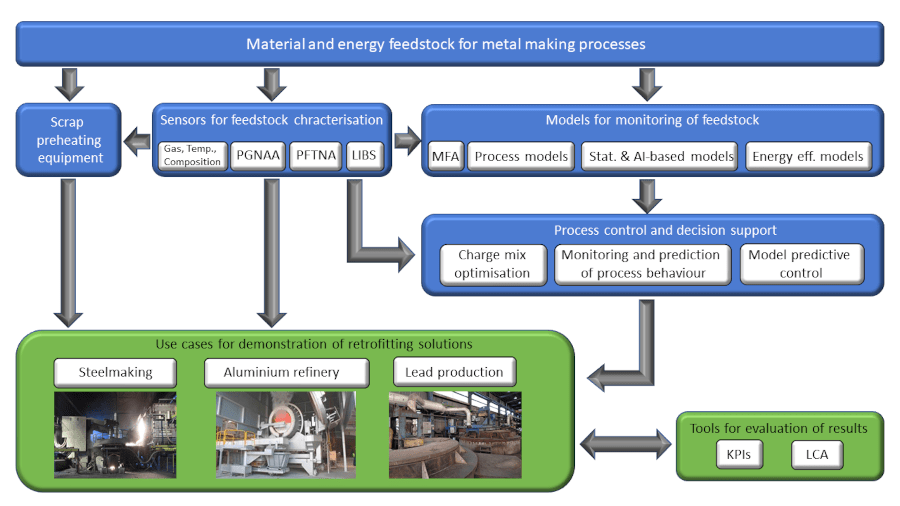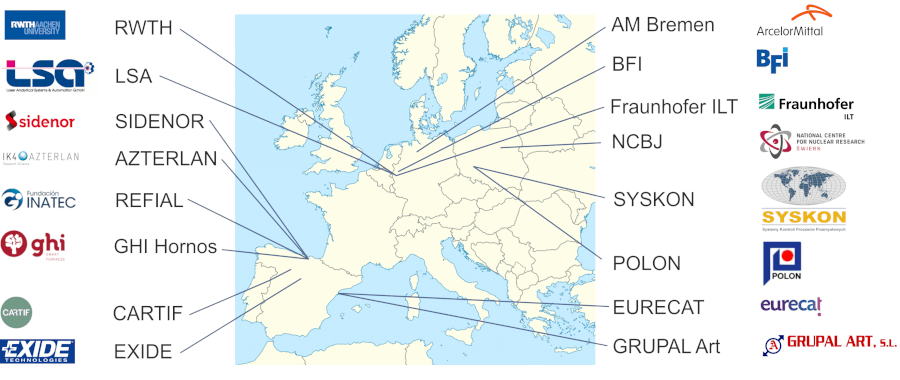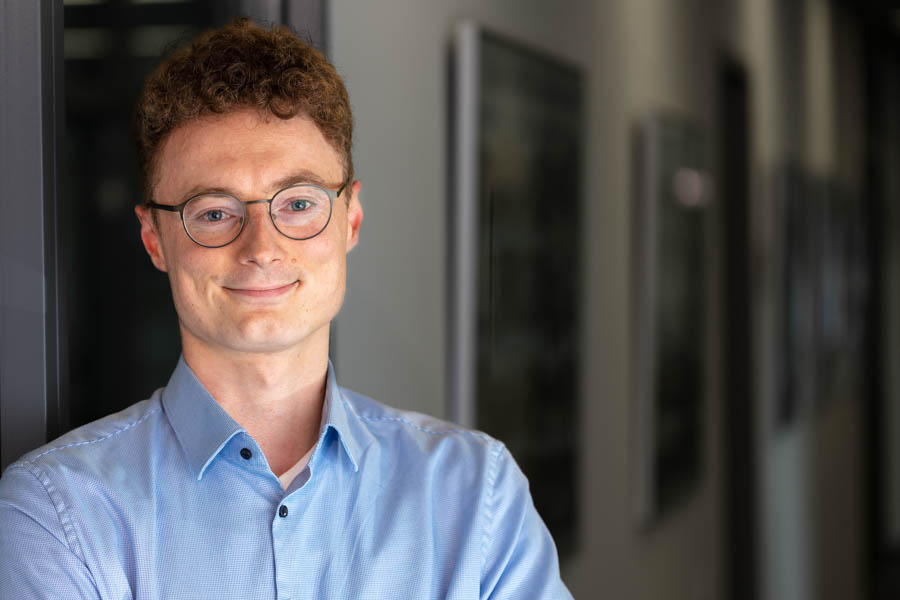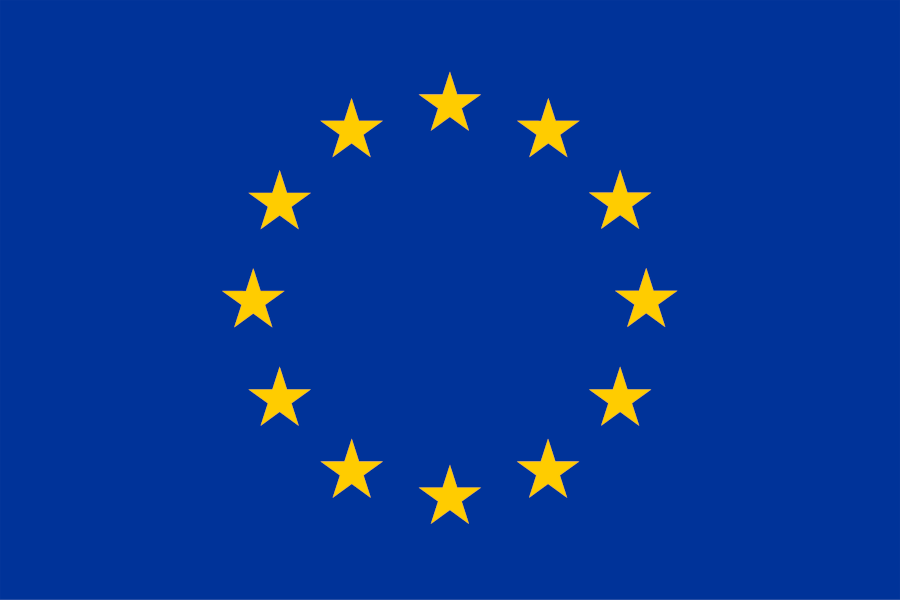REVaMP: Retrofitting Equipment for Efficient Use of Variable Feedstock in Metal Making Processes
Horizon 2020, EU SPIRE, 1 January 2020 to 31 December 2023
Project description
In the European process industries large amounts of energy and resources are used to produce millions of tonnes of materials each year. Especially in metal making processes, metallic scraps from end of life goods are recycled and used as secondary raw materials in the processes. Usage of scrap is both ecologically and commercially beneficial, since it reduces the depletion of natural resources like virgin ores and avoids landfills with waste material. Today even more important is that the energy consumption and the CO2 emissions of the reduction processes of metal ores can be reduced or even totally avoided when using recycled materials as feedstock. However, using increasing amounts of scrap in the feedstock bears challenges, since the chemical composition of the scrap can vary significantly by region, by time and even from piece to piece.

Interaction of the different retrofit solutions for the use cases in REVaMP.
On the one hand, the amount of valuable elements in the scrap which are used for alloying of the metal, increases the price of the scrap and needs to be quantified. On the other hand, the amount of tramp elements which cannot be removed from the melt anymore needs to be minimised. Steriles, i.e. non-metallic materials like soil, sand and wood, which can be present in the scrap material, decrease the material yield as well as the energy efficiency of the melting process. Also the scrap needs to be free from water which can cause explosions during metal production, and from plastics, which can deteriorate the off-gas emissions, e.g. in terms of dioxins. Last but not least, it needs to be assured, that explosives and radioactive sources included in the scrap materials are not transferred to the production cycle.
Furthermore, energy consumption is of central concern for the metal making industry. Although melting and refining of recycled metal scrap requires much lower energy inputs than needed to produce primary metals from virgin mineral ores, electrical energy and fuels consumption still account for the major share (30% to 60%) of metal making costs.
Therefore, existing metal production plants need to be retrofitted with appropriate sensors for scrap analysis and furnace operation, to cope with the varying conditions of the feedstock regarding materials and energy. Furthermore, the selection of the optimal feedstock in terms of material and energy efficiency has to be improved by application of appropriate process control and decision support tools. Also solid scrap preheating systems can increase the energy efficiency of the melting processes. To monitor and control the process behaviour in an optimal way, model-based software tools have to be developed and applied.

Overview of the project partners involved in REVaMP
The main objective of the REVaMP project is to develop, adapt and apply novel retrofitting technologies to cope with the increasing variability and to ensure an efficient use of the feedstock in terms of materials and energy. This will be exemplarily demonstrated within three different use cases from the metal making industry. Due to the industrial relevance, the use cases were chosen from electric and oxygen steelmaking, aluminium refining and lead recycling. The performance of the different technologies will be assessed, and the benefits will be quantified.
The REVaMP project will develop and test retrofit solutions for the European process industry, especially for the very resource and energy intensive metal production. With advanced process-specific tools for (secondary) raw material characterization, energy efficiency improvement, and process monitoring and control, energy and raw material efficiency will be significantly improved. This is demonstrated below by a detailed assessment of the expected impact on the different use cases of steel, aluminum and lead production. The assessments are based on the production plants involved and are then scaled up as far as possible to all plants of the partners concerned and finally on a European level according to the total production capacity in Europe.
As a partner in the REVaMP project, the Institute for Industrial Furnaces and Heat Engineering is leading the work package “Evaluation of Retrofit Solutions on an Industrial Scale”. Within this framework, extensive material flow analyses (MFA) and life cycle assessments (LCA) are carried out and coordinated. In close cooperation with the partners SIDENOR, GRUPAL and EXIDE, the IOB will develop three material flow analyses as well as three life cycle assessments for different production scenarios of steel, aluminum and lead production. Finally, an evaluation of the developed and implemented retrofit solutions will be carried out with regard to technical, ecological and economic aspects as well as their cross-sector transferability.
Project goals
- Adaption and application of novel sensors for characterisation of metal scrap regarding chemical composition
- Adaption and application of a metal scrap preheating system operated with waste derived fuel
- Setup and validation of software tools to model the operational input conditions of the processes
- Setup of monitoring and control systems to optimise the processes for metal production at varying feedstocks
- Implementation of retrofitting technologies in three different industrial use cases: Steelmaking, Aluminium refining and Lead recycling
- Evaluation of the retrofitting solutions in terms of economic and ecological effects, as well as the cross-sectorial applicability in other process industries
- Valorisation, dissemination and exploitation of the project results for the process industry
Project participants
- VDEh-Betriebsforschungsinstitut GmbH (DE)
- National Centre for Nuclear Research (PL)
- Systemy Kontroli Procesów Przemysłowych (Syskon) (PL)
- Ośrodek Techniki Jądrowej Polon we Wrocławiu Sp. z o o. (PL)
- Fraunhofer-Gesellschaft zur Förderung der angewandten Forschung e.V.; Institute for Laser Technology (DE)
- Laser Analytical Systems and Automation GmbH (DE)
- ArcelorMittal Bremen GmbH (DE)
- Sidenor Aceros Especiales S.L. (ES)
- Fundació Eurecat (ES)
- Grupal Art, S.L. (ES)
- Fundación Azterlan (ES)
- GHI Hornos Industriales, S.L. (ES)
- Refinería de Aluminio S.L. (Refial) (ES)
- RWTH Aachen, Industrial Furnaces and Heat Engineering (DE)
- Fundación Cartif (ES)
- Exide Technologies S.L.U. (ES)
Further Information
Contact

+49 241 80–25943
Funding

This project receives funding from the European Union’s Horizon 2020 research and innovation programme under grant agreement ID 869882.
The funding is provided as part of the call “CE-SPIRE-05–2019 — Adaptation to variable feedstock through retrofitting”
